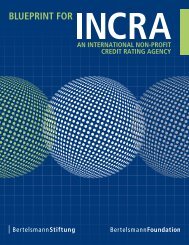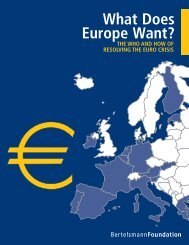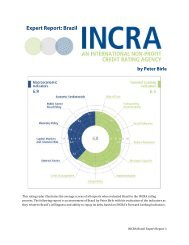MEMO ONTHE ARAB UPRISINGThe State of PlayOn Dec. 17, 2010, in Sidi Bouzid, Tunisia,street vendor Mohamed Bouazizi—fed up with constant harassment fromthe local police and the confiscationof his produce cart—set himself onfire in protest ultimately causing hisdeath. Within a few weeks, the wholeArab world was ablaze. The region’sdangerous mix of repressive andautocratic governments, pervasivecorruption, human rights abuses andstuttering economic growth made itfertile ground for revolution. By Jan. 14,2011, a mere four weeks after Bouazizi’sself-immolation, general protests inTunisia had succeeded in overthrowingZine El Abidine Ben Ali, the autocraticleader in power since 1987.Tunisia’s dramatic achievementimmediately resonated across the Arabworld. Within days of Ben Ali fleeing hiscountry, demonstrations broke out inEgypt, Oman, Jordan and Saudi Arabia;mass protests forced Egypt’s strongmanHosni Mubarak out of office on Feb.11; and unrest moved on to furthercountries, including Libya, Bahrain,Morocco and Syria. The fate of theseopposition movements varied across theregion, shaped by the differing goals ofthe protesters—from regime change inNorth Africa to reform from within in theGulf—and the spectrum of responsesfrom the various governments. Thereactions ranged from yielding toprotesters’ demands (Tunisia and Egypt)all the way to brutal crackdowns leadingto full-blown revolutions (Syria andLibya). 1The Arab uprising blindsided Europe andthe US, and tore apart the Faustian pactthat had characterized European policytowards North Africa—overlookingthe human rights abuses of autocraticThe outbreak of the Arab uprising proved a humblingexperience for Europe, which was taken by surprise bythe protests and embarrassed by its close ties with theautocratic rulers of North Africa.rulers in exchange for those rulersmaintaining security and stability inEurope’s backyard. 2 Eventually, however,the US and the leading European statesrecovered from their initial shock,acknowledged their past mistakes andtook steps to make sure they moved tothe “right side of history”. They optedto back protest movements and tocondemn governments who tried torepress these movements by force. InLibya, NATO, led by the UK, France andthe US, intervened in order to protectcivilians from Moammar Gaddafi’s forcesand decisively tipped the balance infavor of the rebels.Europe and the US also played aprominent role in establishing theDeauville partnership to aid Arabcountries in transition. The G8 summitin May 2011 led to an agreementbetween G8 members and majorinternational institutions (such as theIMF, the World Bank, the European Bankfor Reconstruction and Development,and the European Investment Bank)to pledge $40 billion in aid from 2011to 2013 for Egypt and Tunisia. A latermeeting in fall 2011 upped the pledge tonearly $80 billion and extended the aidto Jordan, Morocco and Libya. 3In the past two years, the Arab uprisinghas caused (and is still causing) seismicchanges across North Africa and theMiddle East. The regional transitionwill continue to unfold over the longterm and will be volatile. 4 The lingeringuncertainty will present significantpolicy challenges for Europe and the US.While the international community hasso far refrained from any direct militaryintervention in Syria, that country’s civilconflict rages on and risks spilling overits borders. The impact of the eurozonecrisis on Western donors threatensthe strong promises of support for theMiddle East and North Africa, with manycountries still waiting for promisedfunds. 5Furthermore, Europe and the US aregrappling with the emergence of newpolitical actors that do not view themfavorably. Islamist parties, despite theirminor role in the protests, have comeout on top in the various elections heldacross North Africa since the start of theuprising. Ennahda gained 37 percentof the votes in Tunisia in the October2011 elections; the following month, theJustice and Development Party gainedthe largest number of seats in Morocco(107 out of 395, with 27 percent of thevotes); and the Freedom and Justice Party,founded by the Muslim Brotherhood,won nearly 45 percent of the seats inthe Egyptian parliamentary election. 6 InJune 2012, Muslim Brotherhood memberMohamed Morsi won the presidency inEgypt.The violent protests outside the USEmbassy in Cairo in September—inresponse to an anti-Islam film made inthe US—also underscored the fact thatthe establishment of democracy in NorthAfrica will not necessarily translateinto pro-Western governments; the3 2The Arab Uprising
concurrent terrorist attack in Benghazi,Libya, that left the US ambassador andthree other diplomats dead, as well asthe attempted attack against the Britishambassador’s convoy in Benghazi a fewmonths earlier, were grave remindersof the continuing security risks. 7Finally, the stability of many of theregimes across the Arab region remainsprecarious, especially in North Africa:Egypt’s Morsi is facing major protestsover the drafting of a new constitution,while lawlessness poses a major concernin the Sinai region; In Libya, the GeneralNational Congress lacks authority, withmuch of the real power in the handsof the regional militias; and Algeriaand Morocco’s commitment to reformappears questionable at best. 8European PerspectivesThe outbreak of the Arab uprising proveda humbling experience for Europe,which was taken by surprise by theprotests and embarrassed by its closeties with the autocratic rulers of NorthAfrica. But the uprising also persuadedthe EU and many member states torethink their approach towards theregion, in particular North Africa, and toplace a greater emphasis on nurturingcivil society as opposed to simplycooperating with local authorities.Two major setbacks drove France toshift its policy towards North Africaand the Middle East. President NicolasSarkozy’s pet project, the Union for theMediterranean, launched in July 2008to provide new momentum to the Euro-Mediterranean Partnership, never reallydelivered on its grandiose promises.The outbreak of Arab uprisings alsocaused great embarrassment for Franceby underlining the close ties betweenFrench officials and the Ben Ali family inTunisia, a symbol of France’s complicitrelations with autocratic regimes inNorth Africa. 9 In the short term, to marka decisive break with the past, Sarkozyquickly switched to providing firmsupport for the Arab revolutions, took aleading role in the response to the Libyaconflict and pushed for G8 financialsupport. In the longer term, Sarkozy’sforeign minister, Alain Juppé, took stepsto recalibrate France’s strategic approachtowards North Africa and the MiddleEast, emphasizing the importanceof values over security, protectingfundamental freedoms, building moreties with civil society and engaging withall actors, including Islamic parties. 10Sarkozy’s successor, François Hollande,and his Foreign Minister Laurent Fabiushave, for the most part, endorsed thisnew approach towards the Arab region. 11Hollande also promises to play an activerole in the efforts to remove Bashar al-Assad in Syria, with France taking thelead as the first Western country torecognize the newly formed coalitionof Syrian opposition groups. 12 As forNorth Africa, because of its position asa leading donor—in 2010 France gave atotal of $595 million in aid, comparedwith $505 million for EU institutions—France will continue to play a vital rolein the region. 13The backlash against its hands-offapproach to the Arab uprising has alsoled Germany to readjust its diplomaticapproach. In particular, though ForeignMinister Guido Westerwelle declared hissupport for the uprising during a visit toCairo’s Tahrir Square, Germany dismayedits allies on both sides of the Atlantic bystaying on the sidelines of the Libyanintervention. That decision appearedeven more eye-opening in light of a €1.5billion deal to sell 200 Leopard tanks toSaudi Arabia while the latter was helpingauthorities in Bahrain to repress prodemocracyprotests. 14 As a consequenceof the strong criticism of its stance onLibya, Germany opted to take a moreproactive stand. To that end, Westerwellemade a timely trip to Algeria, Libya andTunisia in early 2012, promising to investmore resources to help democraticdevelopment in the region. 15 This newemphasis notwithstanding, trade andeconomic objectives will likely continueto fundamentally shape Berlin’s policiestowards the Arab world—the substantialrise in arms sales to Algeria from €20million in 2010 to €400 million in the twoyears since being yet another example. 16But Germany has also learned lessonsfrom Libya, and will make sure in thefuture to be in the middle of the pack,as opposed to an outlier, when it comesto major security challenges involvingthe Western alliance. This pragmatismis seen in its willingness to send Patriotmissiles to Turkey to help defend thelatter’s border with Syria. 17Like other European states, the Arabuprising came as a complete surpriseto the UK, whose diplomatic andintelligence resources failed to predict therevolutions—in part because agencieshad cut resources devoted to the regionin previous years. 18 Like France, though,the UK quickly switched to a resolutesupport for the uprising, includingtaking a leading role on Libya. Despitethe slow pace of change in the MiddleEast and North Africa, Prime MinisterDavid Cameron will remain firmlycommitted to the process of transition,driven by his view that it presents a greatopportunity for the region and that anybacksliding towards authoritarianismwould be detrimental to the interestsof the UK. 19 In regard to the Syrianrevolution, London has played and willcontinue to play an active role. Though ithas not endorsed military intervention,the UK has provided humanitarian aidand non-lethal equipment to the Syrianopposition, intelligence reports (alongwith Germany) on Syrian governmenttroop movements and agreed with Franceto speed up efforts for the opposition tocreate a government. 20 Cameron alsorecently floated the idea that Londonwould be willing to arrange a safe exit,and possible immunity, for Assad if thiscould help end the conflict. 21Like the individual member statesmentioned above, the first response ofthe EU institutions to the Arab uprisingcan only be described as lacklusterand hesitant. But the initial inactionof member states, combined with thetimely 2010 revision of the EuropeanNeighborhood Policy (ENP)—a bilateraltool for relations with eastern andsouthern neighbors—enabled theEU to take a leading role. The jointcommunication 22 provided in March2011 by Commission President JoseManuel Barroso and High RepresentativeCatherine Ashton outlined a newapproach towards the Arab world: Itlaid out an aim (supporting transitionsand deep democracy in the region), theThe Arab Uprising3 3
- Page 3: Field Manual to EuropeIntroduction
- Page 6: multilateral channels. Europeanshav
- Page 9 and 10: JuneBritish presidency of UNSCJune
- Page 12 and 13: US-EU Investment vs. Global Nationa
- Page 14 and 15: economic conditions in the eurozone
- Page 17 and 18: MEMO ONTHE EUROZONE CRISISThe State
- Page 19 and 20: attitude toward moral hazard. Withw
- Page 21 and 22: Greece: 2010 Bailout BreakdownGreec
- Page 23 and 24: the deficit from 4.5 percent to thr
- Page 27 and 28: NATO thus faces an uncertain future
- Page 29 and 30: 1. Consider NATO’s defensespendin
- Page 31: of-area operations and worldwidepar
- Page 35: 2. Strengthen regionalpartnerships
- Page 38 and 39: MEMO ONCOUNTERTERRORISM ANDHOMELAND
- Page 40 and 41: home affairs (JHA), particularly in
- Page 43 and 44: Status of EU Countries in the US Vi
- Page 45 and 46: offensive capability centered at NA
- Page 47 and 48: socialized, i.e. there is a tacit e
- Page 49 and 50: such technology, such as deep packe
- Page 51 and 52: MEMO ONENERGY & CLIMATE CHANGEThe S
- Page 54 and 55: identifying the agents most qualifi
- Page 56 and 57: MEMO ONTURKEYThe State of PlayTurke
- Page 58 and 59: as a rising regional and internatio
- Page 60 and 61: CASE STUDY: TURKEY’S ENERGY ROLE:
- Page 62 and 63: 22%12%Turkey’s Main Trading Partn
- Page 64 and 65: MEMO ONRUSSIAThe State of PlayIn Pr
- Page 66 and 67: EU-Russia security apparatus. Themo
- Page 68 and 69: greater market access for US busine
- Page 70 and 71: MEMO ONCHINAThe State of PlayIn 201
- Page 72 and 73: But China’s competitive meridian
- Page 74 and 75: in millions of USDUS-China Bilatera
- Page 76 and 77: 7 6Acknowledgements
- Page 78 and 79: CITATIONSINTRODUCTION1See “Confid
- Page 80 and 81: 20Castle, S. (17 September, 2011).
- Page 82 and 83:
ARAB UPRISING1Koch, C. (summer 2011
- Page 84 and 85:
COUNTERTERRORISM & HOMELAND SECURIT
- Page 86 and 87:
21Healey, J. (January 2012). Beyond
- Page 88 and 89:
20Berlemont, I. (25 July, 2012). Fr
- Page 90 and 91:
24Putin, V. (6 September, 2012). An
- Page 92:
Bertelsmann Foundation1101 New York






